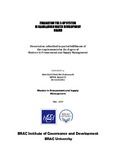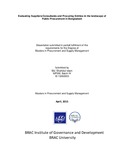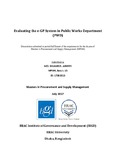| dc.contributor.advisor | Rahman, Mir Mehbubur | |
| dc.contributor.advisor | Uddin, Md Jasim | |
| dc.contributor.author | Mozumder, Arpita | |
| dc.date.accessioned | 2025-02-10T06:03:11Z | |
| dc.date.available | 2025-02-10T06:03:11Z | |
| dc.date.copyright | 2023 | |
| dc.date.issued | 2023-12 | |
| dc.identifier.other | ID 21382018 | |
| dc.identifier.uri | http://hdl.handle.net/10361/25363 | |
| dc.description | This internship report is submitted in partial fulfillment of the requirements for the degree of Masters in Procurement and Supply Management, 2023. | en_US |
| dc.description | Cataloged from PDF version of internship report. | |
| dc.description | Includes bibliographical references (page 39). | |
| dc.description.abstract | Sustainable Public Procurement (SPP) is a growing concern of the time to seek balance between
three fundamental cornerstones of sustainable procurement – social, environmental, economicalong
with ensuring good governance by adopting fairness, competitiveness, transparency,
accountability in the procurement of goods, works and services using public fund. To ensure good
governance specially in public procurement, Government of Bangladesh showed it’s commitment
by adopting Public Procurement Act, Public Procurement Rule and developing Standard Tender
Documents from early decade of the century. It is also mentionable that electronic government
procurement is an excellent tool used by government agencies over time towards meeting the
commitment. Government is now looking forward to respond the call of time through Sustainable
Public Procurement Policy which is recently developed.
The study report tried to scrutiny public procurement legal documents under practice and
attempted to sketch up the strength and weakness of these documents and way forward. Current
documents have some excellent command over various sustainability issues, like social,
economic, environmental considerations through addressing labor issues, environmental issues,
local enterprise encouragement issues. Yet these are inadequate to meet the current demand of
sustainability considerations.
Bangladesh Public Procurement Authority (BPPA) has recently developed SPP policy paper and
now working to develop necessary follow up documents. SPP policy considers climate change
issues, the cost of ownership, whole life cycle costing, most economically advantageous tender
and other modern concepts to ensure sustainability in public procurement.
Following the best practices in the world Bangladesh is committed to develop globally accepted
documents for proper implementation of SPP. Qualified resources and manpower is a prime
concern in this regard to achieve the target of a sustainable green world and contribute for future
generation. | en_US |
| dc.description.statementofresponsibility | Arpita Mozumder | |
| dc.format.extent | 39 pages | |
| dc.language.iso | en | en_US |
| dc.publisher | BRAC University | en_US |
| dc.rights | | |
| dc.subject | Sustainable Public Procurement (SPP) | en_US |
| dc.subject | Legal documents | en_US |
| dc.subject | Good governance | en_US |
| dc.subject | Public procurement act | en_US |
| dc.subject | Electronic government procurement | en_US |
| dc.subject | Sustainability issues | en_US |
| dc.subject | Climate change | en_US |
| dc.subject | Whole life cycle costing | en_US |
| dc.subject | Most economically advantageous tender | en_US |
| dc.subject | Bangladesh Public Procurement Authority | en_US |
| dc.subject | Future generations | en_US |
| dc.subject.lcsh | Public procurement | |
| dc.title | Sustainable public procurement practice in Bangladesh : reviewing the legal documents | en_US |
| dc.type | Internship report | en_US |
| dc.contributor.department | BRAC Institute of Governance and Development | |
| dc.description.degree | M. Procurement and Supply Management | |




